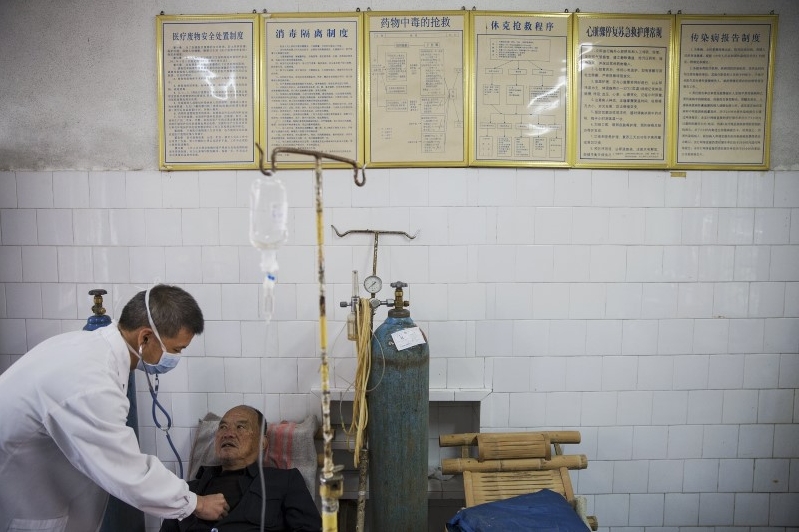
Yangjia Hospital in remote Wuyi County in eastern China has become a home-from-home for Hu Hushen, 78, a former miner suffering from "miner's lung", as the disease pneumoconiosis is often called, since 1976.
Hu, and his wife, have been staying at the Zhejiang province hospital for nearly a decade. He spends most of his time hooked up to oxygen to treat his lungs, ravaged by working through the 1960s and 1970s in a since-closed mine.
The hospital, once equipped with the latest machinery and 150 staff, is now overgrown in parts with creeping vines, broken windows and derelict rooms, hit by falling patients numbers, a lack of funds, and weak government support for local healthcare.
Spending on healthcare as a slice of gross domestic product is small at about 6 percent in 2013 compared with 17 percent in the United States, World Health Organization data show, while there is a dangerously wide gap between rural and urban care.
"If we just treat this illness alone then we are putting ourselves on the road to oblivion, we need to expand what we do in all directions - it's the only way to survive," hospital director Fu Jianghua told Reuters.
Fu, who has worked at the Yangjia Hospital since 1983 when it was operated by a mine, said it was hard to get new equipment or even the money to repair things when they broke.
The hospital treats pneumoconiosis, a disease caused by inhaling large amounts of dust and which mainly affects coal miners. There are an estimated 6 million workers with the condition in China, with 20,000 new cases every year.
"Someone asked 'why didn't you wear a mask?'. We did have a protective mask, but it was dry," explained Shi San'er, a patient at the hospital. "The dust flowed through both sides of my nose to my mouth. Then the dust went inside my body."
SENSE OF COMMUNITY
The facility was first built in the 1950s and expanded by the East Wind Fluorite mining company in 1962. By the 1980s it was a well-respected clinic for lung disease and had advanced equipment including X-ray machines from Japan.
Now, just 30 patients remain, often accompanied by family members who pay an extra 6 yuan ($1) a day to stay. Conditions have declined steeply since the hospital went broke in 2001 and was put under government control before being privatized.
The situation reflects the challenge China is facing to reform its healthcare system, which is blighted by crowded hospitals, corruption, simmering tension between patients and doctors, and steep medical bills.
"A lot of these workers can't get any compensation. They find the economic burden on themselves and their families is terrible," said Geoffrey Crothall, communications director at China Labour Bulletin.
Family members and patients at the Yangjia hospital make the best of things: cooking in makeshift kitchens, growing vegetables in allotments around the buildings and playing cards to pass the hours.
Hospital staff and patients said they lived together like a commune and treated each other as family.
Wang Tianfang, who was diagnosed with dust lung in the 1970s and has lived at the hospital for two years, said he chose to stay because of the affordable price, but also that the hospital had been built by the company he had worked for.
Sitting in bed with various bags of possession hanging on the wall behind him and a rusty blue tank of oxygen beside the bed, Wang blew smoke out of his pipe - a guilty pleasure despite his disease: "It feels like family here".
(Reporting by Damir Sagolj and Jiang Xihao in WUYI, China; Diana Chan in HONG KONG; Writing by Adam Jourdan; Editing by Robert Birsel)






